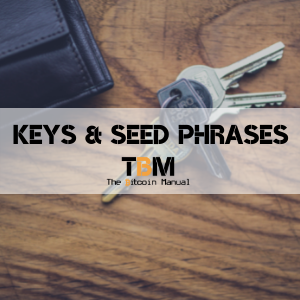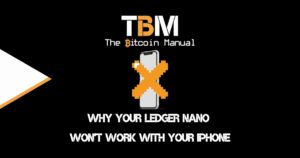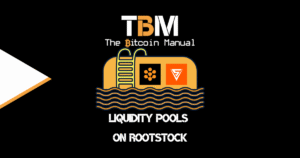Keys & Seed Phrases
Home » Storage & Security » Keys & Seed Phrases
Bitcoin uses private and public-key cryptography to secure your valuable BTC, and as a bitcoin user, it’s up to you to manage the end to end process of generating these keys and keeping them safe. These keys are essentially your unique and private gateway to the bitcoin blockchain. These private and public keys are used in combination and allow you to sign transactions, move bitcoin to and from wallets, and of course, lay claim to certain bitcoin UTXOs stored in a specific wallet.
Learning to manage your keys is the best and safest way to use bitcoin, to remain sovereign and never trust anyone with your funds.
There is a saying in this neck of the woods that goes along “Not Your Keys, Not Your Bitcoin”. The phrase means that if you don’t own or have access to the private keys of your Bitcoin wallet, then that Bitcoin is not truly yours.
If you’re unsure what the whole issue is with private and public keys, then here are the essentials.

What is a public key?
A bitcoin public address or public key is a cryptographic code that allows users to receive bitcoin into their account. The public key coupled with the private key is an essential tool required to ensure the security of the bitcoin economy. Everyone who owns a bitcoin wallet has to have a unique identifier or address – similar to as you would have with a bank account.
Even though these public addresses are unique to you, you don’t only have one address, and you can generate a new address that will lead to the same account. So you could have one wallet and use multiple public addresses created by that wallet to receive bitcoin from different sources.
The public address of your wallet allows you to receive bitcoin from other wallets or bitcoin exchanges.
When you generate a public address, it can come in two forms:
- A long string of text and numbers
- QR code
Once you’ve generated the public address, you can use this address to receive bitcoin and track any transactions two or from that address using a block explorer or your node.
Public Address – This is what you need to give to others so that you can receive Bitcoin.
What is a private key?
A bitcoin private key or seed phrase is the unique way in which you claim ownership of a bitcoin wallet and any contents inside that bitcoin wallet. A private key is hands down an essential part of the bitcoin experience and should be guarded with the utmost care as, without it, you will lose access to your funds or worse, someone else could find it and grant themselves access to your funds.
Private keys are what you use to sign, authorise or confirm a transaction if you want to send Bitcoin out. In other words, the private key grants access to your Bitcoin funds, so if you give someone this, then they have access to your Bitcoin wallet, and that’s not ideal!
Your seed phrase is an encrypted version of your private keys, but rather than a long sequence of letters and numbers; it’s in an easy-to-remember 12 or 24-word sequence instead. Think of it as your backup. You are not limited to 24 words and can add additional words for more security.
Using your seed phrase, you can restore your wallet to any device and generate new public keys to receive more bitcoin to this wallet.
It is important to guard your seed phrase from prying eyes. If someone has access to your seed phrase, then they also have access to your Bitcoin wallet – not ideal!
You may also want to place your seed phrase on something more robust than a piece of paper to guard it against damage from time, possible fires or flooding. You can do this by using a seed storage device.
Seed phrase storage options
If you’re looking for a way to store your private keys safely, then check out some of the following solutions.
| Product | Manufacture | Website |
|---|---|---|
| Backup Plate | Backup Steel | https://backupsteel.com/ |
| Blockplate | Blockplate | https://www.blockplate.com/ |
| Capsule Duo | Cryptosteel | https://cryptosteel.com/ |
| Capsule Solo | Cryptosteel | https://cryptosteel.com/ |
| Cassette Solo | Cryptosteel | https://cryptosteel.com/ |
| Coinplate Alpha | Coinplate | https://getcoinplate.com/ |
| Coinplate Grid | Coinplate | https://getcoinplate.com/ |
| Coinplate Punch | Coinplate | https://getcoinplate.com/ |
| ColdBit Steel | ColdBit | https://coldbit.com/ |
| ColdTi | ColdTi | https://coldti.com/ |
| Crypto Key Stack | Crypto Key Stack | https://cryptokeystack.com/ |
| Crypto Keys | Crypto Keys | https://crypto-keys.com/ |
| Cypher Seed Board | SafePal | https://www.safepal.io/ |
| CypherGrid | CypherSafe | https://cyphersafe.io/ |
| CypherWheel | CypherSafe | https://cyphersafe.io/ |
| Hodlinox | Hodlinox | https://hodlinox.com/ |
| RoninSteel | Ronin Dojo | https://shop.ronindojo.io/ |
| Seed Phrase Storage Plate | Attenuo | https://attenuo.com/ |
| Simbit Steel Wallet | Sumbit | https://www.simbit.com/ |
| The Billfodl | Privacy Pros | https://privacypros.io/ |
| Thor Kit | Cryptotag | https://cryptotag.io/ |
| Zeus Kit | Cryptotag | https://cryptotag.io/ |
Share with a friend
If you thought this information was helpful why not share it on your favourite social media network and encourage others to learn more about Bitcoin
The latest news from our blog

Why Your Ledger Nano S Won’t Work with Your iPhone
If you’re a Bitcoin holder using an iPhone and own a Ledger Nano S and Ledger Live, you’ve likely discovered a frustrating reality: these popular

What Are Liquidity Pools On Rootstock?
The decentralised finance (DeFi) space has primarily remained in the hands of altcoin chains, promoters claim to have brought innovative financial instruments to the broader

The Stablecoin Lifeline
Why Altchains Will Survive Despite Native Token Devaluation The altcoin landscape has changed compared to previous cycles, despite many a bag holder still clinging onto
